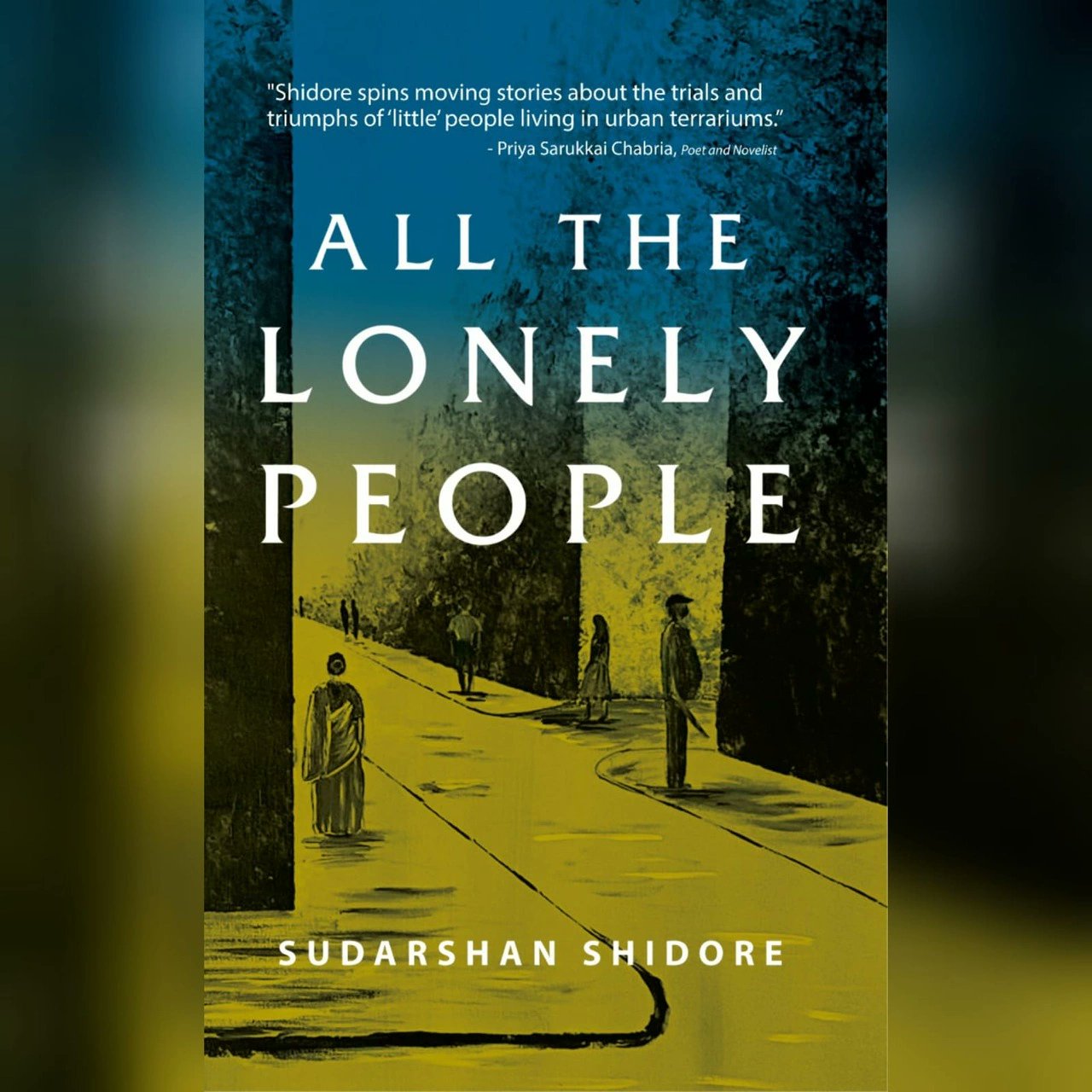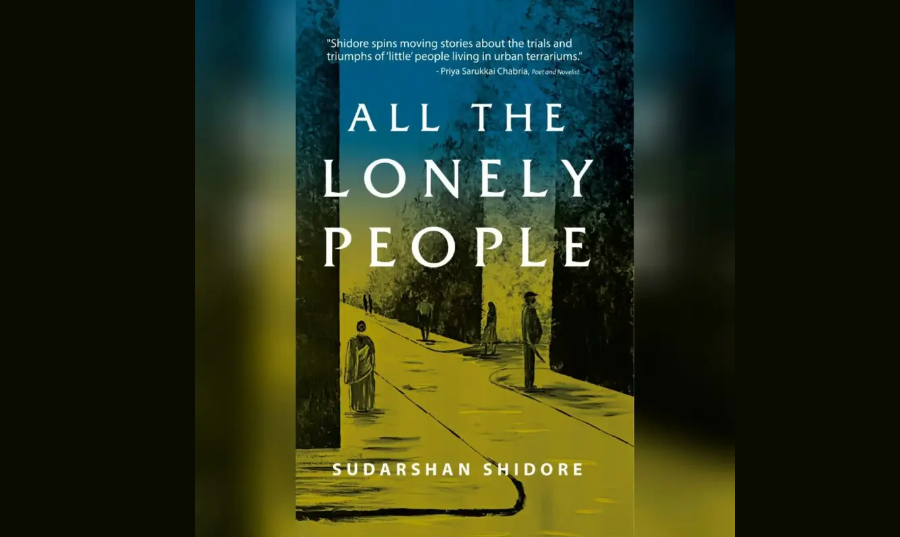All The Lonely People by Sudarshan Shidore explores scenes across six Indian cities and finds out what happens when ordinary—and often lonely—people are confronted by not-so-ordinary situations.
A lonely widow takes in a boarder, not knowing what she is letting herself into...a visit to the circus becomes a sad revelation for an eight-year-old boy...a down-on-his-luck electrician decides to pursue a path of crime...a young classical singer realizes that, to become great, he must give up his ego…a building watchman trapped in the lockdown finds solace in the company of furry felines….
Loneliness has been a huge problem during the pandemic. However, loneliness is not always a bad thing. Sometimes it allows you to find something new about yourself or the world around you. Sometimes it tests your resolve, your understanding of your own identity and your morals. And sometimes—it will make you do things that you had not thought possible. It is time we embrace loneliness and look at the positive side of it. This book does exactly that, through the stories of some very ordinary people.
The author says, “I have always been fascinated by ‘ordinary’ people. You see them everywhere, amidst large crowds in the city. The watchman, the electrician, the backup singer, the middle-aged widow, the labourer—people that one usually doesn’t give a second glance. These are stories seen through a sympathetic lens about such people. Stories that bring home what I call ‘the little truths of life’, the truths that we often take for granted.”
Sudarshan Shidore is a data scientist and psychometrician by profession who chose to study mathematics at IIT Delhi and marketing at IIM Ahmedabad, but never gave up his love for all things literary. His fiction and critiques have been published in Reading Hour, Just Another Magazine (JAM), The Week, The Afternoon, The Sunday Observer, Mid-Day, and other print publications. He has also led edtech and analytics teams across India as part of his work and can often be seen giving talks to students and colleagues on the power and risks that come with the adoption of artificial intelligence.
On the eve of the release of his latest book of short stories, All The Lonely People, Readomania caught up with Sudarshan on his writing, and more.
Readomania: A corporate leader turns into a storyteller. Why?
Sudarshan: Corporate work is but one aspect of my life. I enjoy working with data and models, but I am also an avid reader, theatre-goer, and music aficionado. Given that I watch and read so much and occasionally critique too - and that I enjoy writing - it was but natural that I should write a book sometime. A fiction book at that, because I believe good fiction makes life more meaningful. I really believe that in a world where a cup of coffee can cost Rs. 375, there is a market for good short fiction that can cost Rs. 350. You can keep returning to a favourite book; you can’t do that with coffee, at best you could post a pic of the drink on social media.
Readomania: All the Lonely People, what a lovely name, something that many of us will relate to, especially during the pandemic. How and when did you get the idea of writing this book? Did the pandemic have any role to play?
Sudarshan: Yes and no. In the writing due to time made available by the pandemic, but not really the ideation, it didn’t. The title has been with me for a long time. People with their own thoughts, their worries, their struggles. And lonely because no one knows what is going on in their lives. Lonely by choice sometimes, but often no. You see so many lonely people in crowds in the city. Writing fiction about ‘them’ is rewarding. The idea came sometime in mid-2020. Not sure exactly when, of course. The pandemic played a role in the sense that the four-hour to and fro daily commute to work in Thane was replaced by something I enjoyed doing. Amazingly, after I was done with my writing, I used to go back to work and work for a couple of hours. Talk about the need to unwind during work. In many ways, the pandemic made my work life more productive. And it gave me my first book.
Readomania: It is said that the first book for any author has a huge autobiographical element. Does this statement stand true in your case?
Sudarshan: Oh yes. “Circus”, where I talk about the impact of corporate politics on a ‘happy’ family’s life, or “Eight Places to See in Calcutta” which is a story about a mathematician, or “The Business of Business” which is about a talented graphics artiste in the advertising industry. “The Bench Police” where I had a ringside view from my flat in Mumbai. These certainly. Maybe a few more.
Readomania: Why did you choose to write short stories and not a novel?
Sudarshan: A novel has a much wider temporal and spatial sweep and a larger canvas. I guess there is an intent to depict the life of a person, or a family, and so on. Unless you are a James Joyce, it isn’t easy to write a novel about a day and he was, to use a modern term, awesome. A typical novel also requires more planning and perhaps detailing at a different level. With a nine-to-eight job in analytics, it wouldn’t have been easy to do. But there is much wisdom in stories too. Look at Katherine Mansfield, Saki, and Chekov. So much wisdom. Then, there’s entertainment too in many stories, and that I guess that the easier bit. O Henry and Dahl come to mind straightaway. But it is easier to entertain than to impart wisdom, isn’t it?

Readomania: There are many situations and many characters that you have built for your readers. Tell us something about the writing process and how/why did you select only these characters and situations.
Sudarshan: Well, these characters appeared as a result of a lot of observation. I have tried to make these as believable as possible, but that takes effort sometimes. I chose the situations because – well, each situation and its (often logical) conclusion tells us something about ourselves. That said, there is joy in illogical conclusions. Maybe, in my next book.
Readomania: If you had to pick one story to convert into a novel, which one would you pick and why?
Sudarshan: I guess it would be “Aajoba” – for its historical sweep, its theme, its characters, its denouement. It’s an emotional story, one I really enjoyed writing.
Readomania: Why do you think people should read this book? Is it for the stories that you tell or for the message that you give?
Sudarshan: I like to think that these stories remind us about the “little truths of life”. These truths are around us and we often take them for granted. For instance, I believe “in every victory for someone is embedded a defeat for that person, and in every defeat, there is also a victory”. Or “People who we see as good are capable of bad things, and bad people are capable of good things.” You don’t realize it, but it’s there. The message implies cause and I am not really into that and would never want to be. I certainly don’t want to make a cause (alternative sexuality, the deification of US imperialism, etc, immigrant troubles, etc) a reason for my book becoming popular or being hailed by someone. If a “message” comes through in a story for a reader, I am happy. I didn’t write the story with an intent to give a message, but if a message like “don’t take people at first impression” comes through, fine. It may not even be the message I wanted to convey, but if it starts a train of thought in his mind, that would be good. Coming back to your question, I think it is more for the story than the message – the situations, the development, and sometimes the surprises that bring home these little truths.
Readomania: Let us understand a bit about how you write. Do you have a specific way of writing books? What is your method in writing?
Sudarshan: I guess it starts with an idea. They say that the story drives the plot (or situation) but while writing, I discovered that the reverse is also true – the plot also drives the story forward! Once the idea is a single paragraph, I build on it from there. A lot is to do with mood and imagination. These cannot be forced. Sometimes one waits for the right moment, but of course, one cannot wait too long; it would defeat the purpose. Method? I think it is a lot of hard work. Peace, the right mood, and an occasional shot of caffeine helps! And by the way, I wrote the end of ‘Aajoba”’ while listening to Pt. Bhimsen Joshi.
Readomania: Are there any writing quirks that you follow?
Sudarshan: Not really. I like to open Excel before Word, though. In a strange way, it relaxes me. Maybe because I think about data so much.
Readomania: How long did you take to write this book? What challenges did you face while writing this book?
Sudarshan: I guess it took me nine and a half months. I started in March 2020 and was through by December. But I look back at my drafts and realize that one story – the one about the harassed watchman – was there as a paragraph in 2014.
Readomania: How was your journey from ideation to the final book? Do you remember some moments that are special?
Sudarshan: The journey was amazing. Everyone has highs and lows in an artistic pursuit but that is to be expected. I had to be in Mumbai all through and of course, follow all the pandemic rules – Mumbai is a very efficient city - but I tried writing in different places – cafes, restaurants, and so on. And I made so many friends while doing so. My wife and son were very supportive of my writing. One special moment: I was writing at a five-star hotel in suburban Mumbai, a club/discotheque really. The music was getting me into the mood, and I wrote very well for an hour. After some time, the maitre’d politely asked me to leave, even if I had ordered, because “we don’t encourage people to write here.” Weird. But fun. And I remember finishing the Calcutta story in a single night – it took me seven hours.
Readomania: As we end this interview, tell us who are your favourite authors? What books did you grow up with?
Sudarshan: Oh, I grew up with a lot of Indrajal comics and Amar Chitra Katha – I am a big admirer of what Anant Pai gave to all of us. Then there was young detective fiction which I devoured and that led to more mature crime fiction– by the time I was eleven, I was reading Sherlock Holmes. Thereafter Dickens, Cronin, Asimov, Bronte, Orwell, Bradbury followed. Of late, I mostly read popular math and science (Marcus du Sautoy, Ian Stewart) and not much fiction but I guess my biggest fiction influences are Daphne Du Maurier for her ability to create atmosphere, Satyajit Ray for his amazing visual detail, Vijay Tendulkar for his harsh mirrors to life, Conan Doyle for his style and Saki for his wit. And a few more. I also admire Murzban Shroff, Anita Desai and Rohinton Mistry. All marvellous writers.
Readomania: Thank you Sudarshan, for this wonderful interview. We look forward to a lot more stories from your pen.
Sudarshan's book, All The Lonely People is available as mentioned below.


Comments